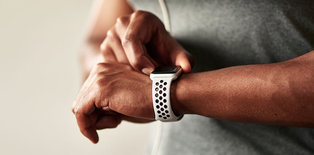Intuitive Eating During COVID

Since the start of social distancing in March, I have been talking with patients about how COVID restrictions have affected their lifestyles, in particular movement and nutrition. There has been much said about weight gain during this time and, as an obesity medicine physician, I have been paying attention to the details!
Many have found their lifestyle to be much less healthy, and lament the unwelcome, easy weight gain that can follow. Others report their habits have improved due to having more time. Very few have said their lifestyle is about the same, except (drum roll please…) the “Intuitive Eaters!” How can that be?
Routines and the motivation behind them
It may come down to how much your behaviors are tethered to your routine. Intuitive Eaters have a different relationship with their day-to-day behaviors. When you are learning Intuitive Eating (IE) you are often fighting against your routine in order to master the IE skills. Once you become an Intuitive Eater, onlookers may think you follow a routine, but it is actually the other way around. Intuitive Eaters develop their daily routine around IE.
Ask yourself: “If I am not following a fixed schedule, am I able to live an optimal lifestyle?” For better or worse, if your lifestyle is predominantly based on scheduling and habit, it is vulnerable to change. Before COVID, I saw this all the time. Patients gain weight on vacation, or when they change jobs. In fact, most examples of gain were heavily influenced by a change in routine. My favorite patient account is, “I gained weight when I moved to Rhode Island!” COVID restrictions have presented an opportunity for me to see the effects of change on a greater number of people experiencing a life change at the same time and to see this effect more clearly.
So, what can we learn from this? The more you understand your motivation for how you eat and how much you exercise, the better armed you are to adapt when life changes. For example, if you exercise because you feel less stressed and enjoy feeling fit, you are more likely to adapt when the gym is closed due to COVID. You want to feel the same—so on-line classes, using home weights or resistance bands, or taking walks outdoors are all plan B options you consider. Second best is OK because it still works.
If, on the other hand, you exercise for your appearance and a desire to maintain your weight, you are easily thrown off your exercise routine. Self-objectification -- judging our bodies the way we imagine society would – puts us at the highest risk for this. Any obstacle, such as the gym closing or change in work routine, can trigger subconscious thoughts that tell us our goal can wait. It goes on the back burner very easily because it never goes away. Losing weight or improving our appearance can be, after all, a lifelong mission. With exercise in particular, we can be conditioned to stop for even the slightest upset in routine. Those that keep going have usually found a deeper benefit to exercise that goes beyond appearance and weight.
Food and routines
Does this apply to food? Yes! People often design their own meal plan and “stick to it” when at work. You may enjoy the food and feel content in the established habit, but if it is not connected to your body signals you can be unwittingly thrown off when things change. During COVID you may be spending long, unaccustomed hours at home, roaming near the fridge. You “react” to the food you see and find yourself eating it. You feel in unfamiliar territory and blame the food. Then you blame yourself! Your “lack of discipline” worsens your mood making it harder to sort out. You eventually make a “new plan” but it takes weeks, if not months to figure out and often only after gaining weight.
Listen to yourself
Intuitive Eaters listen to their body and mind.
- They have learned to ask themselves: “Am I hungry?”
- They eat mindfully what the body needs - no more and no less.
- They are highly attuned to their bodies not their “diet rules.”
- They stop eating when they are comfortably full, knowing they can eat again when hungry. Intuitive Eaters are not dieters, they do not feel guilty about what they eat. They seek satisfaction by asking, “What do I want that will satisfy my mind and my body?”
Whether it is during a pandemic, the holidays, being on vacation or even living in Rhode Island, nothing changes this. Once an Intuitive Eater, always an Intuitive Eater.
Why not become one this winter? It’s a perfect time to learn.
Visit our website for information on our Healthy Way program at the Lifespan Lifestyle Medicine Center and learn how we can help you.

About the Author:
Sheenagh Bodkin, MD
Dr. Sheenagh Bodkin is director of obesity medicine for the Center for Bariatric Surgery at The Miriam Hospital.
Lifespan Living Newsletter
Find a Doctor

The right provider is in our network
Search more than 1,200 providers in our network.



